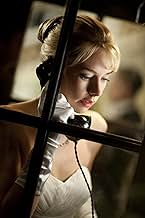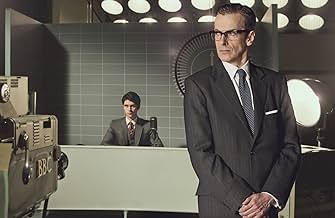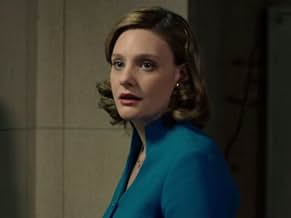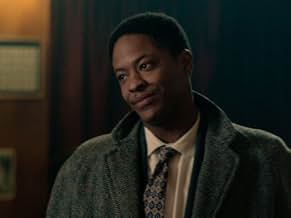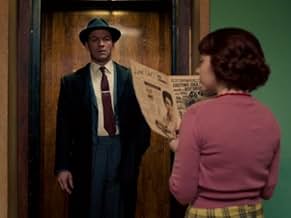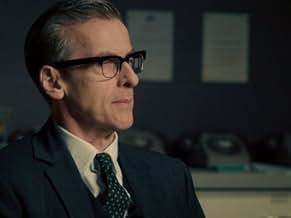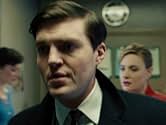Un drama entre bastidores y un thriller de espionaje en la Inglaterra de la Guerra Fría que se centra en un periodista, un productor y un presentador de un programa de noticias de investigac... Leer todoUn drama entre bastidores y un thriller de espionaje en la Inglaterra de la Guerra Fría que se centra en un periodista, un productor y un presentador de un programa de noticias de investigación.Un drama entre bastidores y un thriller de espionaje en la Inglaterra de la Guerra Fría que se centra en un periodista, un productor y un presentador de un programa de noticias de investigación.
- Ganó 1 premio Primetime Emmy
- 4 premios ganados y 45 nominaciones en total
Explorar episodios
Opiniones destacadas
I didn't think The Hour was perfect, but overall for me it was very good and intriguing. The Hour does have a slightly slow start, but the pace soon picks up just in time for the tense finale, and I personally loved how ambiguous the ending was. I do also agree that some of the dialogue is rather anachronistic, however in the final episode especially it has several intense and intelligent moments. For any problems The Hour has, it does have potential to grow and there are many things to redeem it. The story is intriguing and full of twists and turns that are brought in and resolved nicely without the drama feeling rushed. The production values are wonderful, right down from the setting, to the photography, to the lighting to the fashions. The music is memorable and not over-bearing or generic like some programmes this year. The characters are interesting with like the series potential to grow. The acting is very good too, especially from Ben Whishaw and Romola Garai, but Julian Rhind-Tutt, Juliet Stevenson, Tim Piggott-Smith and especially Anna Chancellor also make a positive impression. Overall, while imperfect and leaves room for growth, I thought The Hours was very good on the whole. 9/10 Bethany Cox
Review of Series One:
This decent BBC drama miniseries depicts the lives and loves of three journalists working for the corporation during the 1950s. The series gets off to a dodgy start with the first couple of episodes, mainly because the main characters are all so damn cold. It then gets a lot better as we get to know those involved, and by the end it's become a real blast.
Romola Garai's Bel is really the centrepiece of the whole production, the producer who attempts to hold it all together while making some huge mistakes along the way. Ben Whishaw's Freddie is a bit of an oddball at first, but his deepening involvement with the series' conspiracy undertones makes him a character to watch and, come the finale, he's the most interesting by far. Dominic West is faultless, as he has been in everything I've seen him in.
The attention to detail is impeccable, and I particularly enjoyed the way that world-shaping events have a key influence on the plotting. There's romance, drama, murder and humour in spades here, along with strong performances from both veterans (Anna Chancellor, Juliet Stevenson, Tim Pigott-Smith) and relative newcomers (Burn Gorman and Julian Rhind-Tutt are both particularly good).
There are occasional faults – the unravelling of the conspiracy storyline is over-complicated and muddled – but these can be easily forgiven. Altogether a compelling piece of literate TV drama, and I'm overjoyed to hear a second series has been commissioned.
Review of Series Two:
Series two of THE HOUR turns out to be an improvement on the first series, which was great to begin with: the performances are more natural, the storyline more tightly focused, and the sense of danger and impending deadlines far more pronounced.
The series boasts impeccable production designs, intriguingly interwoven plotting and some excellent performances. In this series, Hector is really put through the wringer, allowing the audience some more of Dominic West's finely mannered acting; Oona Chaplin, playing Hector's wife, also comes into her own as a fully developed, sympathetic character for the first time.
There are casualties: Romola Garai is utilised less well here, although Ben Whishaw is as charming as ever. The problem is that the focus is away from Garai, unlike in the first series, and she's given little to do. Everyone else seems to have deeper, stronger character stuff, whereas her screen time is limited to some corny romance that never goes anywhere.
There are missteps, too, not least Abi Morgan's attempt to give ALL of the main characters some emotional storyline, even the nerdy bespectacled comic relief guy. There's just not room for it, and bringing in a typically hissy Peter Capaldi doesn't work either; his sub-plot with Anna Chancellor just left me cold, getting in the way of the REAL story.
Still, these flaws aren't enough to ruin the enjoyment of this series, which just seems to get better and better with each episode. As with series one, it culminates in a remarkably tense and gripping final episode that leaves me hoping for third outing.
This decent BBC drama miniseries depicts the lives and loves of three journalists working for the corporation during the 1950s. The series gets off to a dodgy start with the first couple of episodes, mainly because the main characters are all so damn cold. It then gets a lot better as we get to know those involved, and by the end it's become a real blast.
Romola Garai's Bel is really the centrepiece of the whole production, the producer who attempts to hold it all together while making some huge mistakes along the way. Ben Whishaw's Freddie is a bit of an oddball at first, but his deepening involvement with the series' conspiracy undertones makes him a character to watch and, come the finale, he's the most interesting by far. Dominic West is faultless, as he has been in everything I've seen him in.
The attention to detail is impeccable, and I particularly enjoyed the way that world-shaping events have a key influence on the plotting. There's romance, drama, murder and humour in spades here, along with strong performances from both veterans (Anna Chancellor, Juliet Stevenson, Tim Pigott-Smith) and relative newcomers (Burn Gorman and Julian Rhind-Tutt are both particularly good).
There are occasional faults – the unravelling of the conspiracy storyline is over-complicated and muddled – but these can be easily forgiven. Altogether a compelling piece of literate TV drama, and I'm overjoyed to hear a second series has been commissioned.
Review of Series Two:
Series two of THE HOUR turns out to be an improvement on the first series, which was great to begin with: the performances are more natural, the storyline more tightly focused, and the sense of danger and impending deadlines far more pronounced.
The series boasts impeccable production designs, intriguingly interwoven plotting and some excellent performances. In this series, Hector is really put through the wringer, allowing the audience some more of Dominic West's finely mannered acting; Oona Chaplin, playing Hector's wife, also comes into her own as a fully developed, sympathetic character for the first time.
There are casualties: Romola Garai is utilised less well here, although Ben Whishaw is as charming as ever. The problem is that the focus is away from Garai, unlike in the first series, and she's given little to do. Everyone else seems to have deeper, stronger character stuff, whereas her screen time is limited to some corny romance that never goes anywhere.
There are missteps, too, not least Abi Morgan's attempt to give ALL of the main characters some emotional storyline, even the nerdy bespectacled comic relief guy. There's just not room for it, and bringing in a typically hissy Peter Capaldi doesn't work either; his sub-plot with Anna Chancellor just left me cold, getting in the way of the REAL story.
Still, these flaws aren't enough to ruin the enjoyment of this series, which just seems to get better and better with each episode. As with series one, it culminates in a remarkably tense and gripping final episode that leaves me hoping for third outing.
When receiving a lengthy series of quality, my usual pace is about two hours a night; with The Hour, I went for three, easily, and was hard put not to stay up past midnight and watch the entire series. This outstanding BBC thriller is many things--conspiracy and spy thriller, mystery, romance, period drama--and certainly much more. It has been exquisitely mounted, with lots of convincing period detail, and is acted by a unified ensemble, laying out numerous vivid characters in a plot that begins confusingly, but soon weaves a seductive plot-line that is not merely a whodunit but also reflects social concerns nations face today, about the power of governments and the behind-the-scenes manipulation of events. Its often funny, brilliantly paced, and is intelligent entertainment
I just watched the first episode of the Hour on BBC. It was better than I thought it would be.
I had heard it was supposed to be a lot like Mad Men, or at least very similar. There are a lot of similarities, and in the first episode I think they overdid it at times the fact that it is 1950 where gender roles are quite specific. Apart from that it is not that much like Mad Men at all. This is not so much a show where men are the main characters and it is their work life and how they have to use their strong character to get ahead in a difficult business.
In the Hour it seems to be more about a journalist's life at the time, no matter if you are a man or a woman. Although gender roles will play a part, it is not necessarily the core of the show like in Mad Men. It is not as glamours either.
What I really like about the Hour that there is also a mystery part to it, almost like a police show. In the beginning of the pilot we are introduced to a murder. The police are calling it a robbery, but one of the journalists finds out there are more to the story. The episode then switches between finding out the truth, at the same time as we learn about the life of journalists in the BBC, and how men and women work together to make a new, current affairs show that covers important moments in history. I'm sure historic moments will be highlighted in the show as well.
So a mixture between Mad Men and a police mystery (that doesn't necessarily get solved in every episode).
So so far, very good.
I had heard it was supposed to be a lot like Mad Men, or at least very similar. There are a lot of similarities, and in the first episode I think they overdid it at times the fact that it is 1950 where gender roles are quite specific. Apart from that it is not that much like Mad Men at all. This is not so much a show where men are the main characters and it is their work life and how they have to use their strong character to get ahead in a difficult business.
In the Hour it seems to be more about a journalist's life at the time, no matter if you are a man or a woman. Although gender roles will play a part, it is not necessarily the core of the show like in Mad Men. It is not as glamours either.
What I really like about the Hour that there is also a mystery part to it, almost like a police show. In the beginning of the pilot we are introduced to a murder. The police are calling it a robbery, but one of the journalists finds out there are more to the story. The episode then switches between finding out the truth, at the same time as we learn about the life of journalists in the BBC, and how men and women work together to make a new, current affairs show that covers important moments in history. I'm sure historic moments will be highlighted in the show as well.
So a mixture between Mad Men and a police mystery (that doesn't necessarily get solved in every episode).
So so far, very good.
Comparisons with "Madmen" are inevitable but they also run the risk of distracting the viewer from properly appreciating "The Hour" in its own right. For all the obvious similarities between the two shows with their period-piece settings and respective portrayals of entrenched misogyny, this BBC/Kudos production marches resolutely to the beat of its own drum. "The Hour" is gritty and gray. It's temperature is cold. One of its main themes is the examination of conflict in a variety of forms; the deep internal conflict between ardent idealism and soul-numbing compromise or between personal integrity and ruthless ambition; and the dogged pursuit of truth in the face of suppression and censorship. Other classic struggles between opposing dynamics are also explored. These include individualism and conservatism, inspiration and convention, impoverishment and privilege, courage and fear, rational caution and paranoia, democracy and tyranny etc - all of which are set amid the historic backdrop of two salient international military conflicts. The landscape is panoramic and the brush-strokes reach far and wide but the painting remains clearly defined. All the elements are tautly packed into a 360 minute thought-provoking thriller. If comparisons must be drawn, then "Goodnight and Good Luck" might prove to be a helpful suggestion. With its subtle script, insightful direction, solid casting and a stunning performance from Ben Whishaw, "The Hour" is one of the BBC's finest. Congratulations to all involved with this production. Thoroughly recommended.
¿Sabías que…?
- TriviaBel and Freddie often call each other Moneypenny and James, in reference to iconic characters from the James Bond franchise. Ben Whishaw later joined that franchise as Q in 007: Operación Skyfall (2012).
- ConexionesFeatured in The Wright Stuff: Episode #15.135 (2011)
Selecciones populares
Inicia sesión para calificar y agrega a la lista de videos para obtener recomendaciones personalizadas
- How many seasons does The Hour have?Con tecnología de Alexa
Detalles
- Fecha de lanzamiento
- País de origen
- Idioma
- También se conoce como
- 焦點時刻
- Locaciones de filmación
- Hornsey Town Hall, The Broadway, Haringey, Londres, Inglaterra, Reino Unido(Lime Grove television studio)
- Productoras
- Ver más créditos de la compañía en IMDbPro
Contribuir a esta página
Sugiere una edición o agrega el contenido que falta







